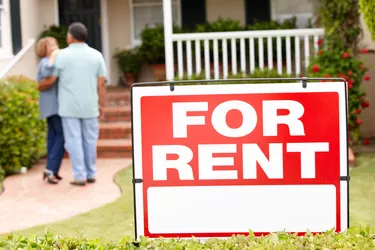
Technically speaking, all tenants in New Jersey have a lease. There are some differences, however, between a long-term lease and a month-to-month lease. If you have a periodic tenancy in New Jersey, you will be pleased to hear that you have many of the same rights as more long-term tenants in the state. Knowing your rights will help you avoid mistreatment from unscrupulous landlords.
Lease Terms
Video of the Day
If you do not have a specified time period for the length of your lease, New Jersey law sets the time period at one month. Your landlord cannot arbitrarily evict you at the end of each month. He has to provide you with at least 30 days' notice that he wishes to end your tenancy. Similarly, you must also provide the landlord with 30 days' notice that you intend to end your tenancy.
Video of the Day
Rent Increases
As a periodic tenant, you are subject to the same laws as long-term tenants with regard to rent increases. All tenants may only have their rent increased at the end of their lease. This means that as a periodic tenant, your landlord must serve you with 30 days' notice that he intends to end your existing lease and increase your rent. Refusing to pay the increase indicates you are not agreeing to it; however, the landlord can then begin eviction proceedings against you. New Jersey law prohibits unconscionable increases.
Health and Safety
Periodic tenants have the same rights as long-term tenants under New Jersey law regarding health, safety and the habitability of the building. Your landlord must keep the building structurally sound, free of pests and must provide reasonable access to utilities. The landlord must also keep all locks and security devices in working order. It is the responsibility of the landlord to make repairs in the building that are related to the normal wear and tear of human habitation.
Evictions
Evictions are another area where periodic tenants have the same rights as those with a long-term lease. Your landlord must go to court to evict you through legal means. He cannot unilaterally lock you out of your apartment, shut off your utilities or confiscate your belongings in an attempt to get you to pay back rent or get you out of the apartment. If this happens, you should immediately contact the police as well as an attorney, since you will be eligible for damages under New Jersey state law.